
Children have been recruited for participation in military operations and campaigns throughout history and in many cultures.

Early childhood education (ECE), also known as nursery education, is a branch of education theory that relates to the teaching of children from birth up to the age of eight. Traditionally, this is up to the equivalent of third grade. ECE is described as an important period in child development.
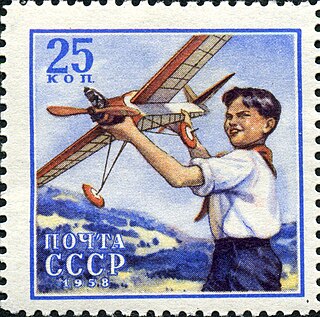
Children's Day is a commemorative date celebrated annually in honor of children, whose date of observance varies by country. In 1925, International Children's Day was first proclaimed in Geneva during the World Conference on Child Welfare. Since 1950, it is celebrated on June 1 in many countries. World Children's Day is celebrated on 20 November to commemorate the Declaration of the Rights of the Child by the UN General Assembly on 20 November 1959. In some countries, it is Children's Week and not Children's Day. The Sikhs celebrate Children Day on 20 December to 27 December. In the U.S., Children's Day is celebrated on the second Sunday of June.

The Mid Day Meal Scheme is a school meal programme in India designed to better the nutritional standing of school-age children nationwide. The scheme has been renamed as POSHAN Scheme. The programme supplies free lunches on working days for children in government primary and upper primary schools, government aided Anganwadis, Madarsa and Maqtabs. Serving 120 million children in over 1.27 million schools and Education Guarantee Scheme centres, the Midday Meal Scheme is the largest of its kind in the world.
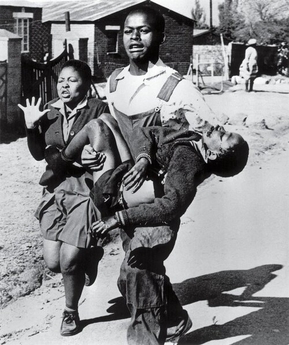
Zolile Hector Pieterson was a South African schoolboy who was shot and killed at the age of 12 during the Soweto uprising, when the police opened fire on black students protesting the enforcement of teaching in Afrikaans, mostly spoken by the white and coloured population in South Africa, as the medium of instruction for all school subject whereas they wanted to learn in their native languages, Xhosa and Zulu. A news photograph by Sam Nzima of the mortally wounded Pieterson being carried by another Soweto resident while his sister ran next to them was published around the world. The anniversary of his death is designated Youth Day in South Africa.

Trafficking of children is a form of human trafficking and is defined by the United Nations as the "recruitment, transportation, transfer, harboring, and/or receipt" kidnapping of a child for the purpose of slavery, forced labour, and exploitation. This definition is substantially wider than the same document's definition of "trafficking in persons". Children may also be trafficked for adoption.

The Soweto uprising was a series of demonstrations and protests led by black school children in South Africa during apartheid that began on the morning of 16 June 1976.
Contributing to the establishment of human rights system in Africa are the United Nations, international law and the African Union which have positively influenced the betterment of the human rights situation in the continent. However, extensive human rights abuses still occur in many sections of the continent. Most of the violations can be attributed to political instability, racial discrimination, corruption, post-colonialism, economic scarcity, ignorance, illness, religious bigotry, debt and bad financial management, monopoly of power, lack/absence of judicial and press autonomy, and border conflicts. Many of the provisions contained in regional, national, continental, and global agreements remained unaccomplished.
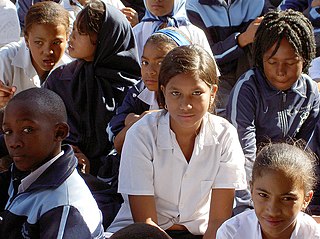
Education in South Africa is governed by two national departments, namely the Department of Basic Education (DBE), which is responsible for primary and secondary schools, and the Department of Higher Education and Training (DHET), which is responsible for tertiary education and vocational training. Prior to 2009, both departments were represented in a single Department of Education. Among sub-Saharan African countries, South Africa has one of the highest literacy rates. According to The World Factbook - Central Intelligence Agency as of 2019, 95% of the population age 15 and over can read and write in South Africa were respectively literate.
Child protection refers to the safeguarding of children from violence, exploitation, abuse, and neglect. It involves identifying signs of potential harm, responding to allegations or suspicions of abuse, providing support and services to protect children, and holding those who have harmed them accountable.

Education in Zimbabwe under the jurisdiction of the Ministry of Primary and Secondary Education for primary and secondary education, and the Ministry of Higher and Tertiary Education, Science and Technology Development for higher education. Both are regulated by the Cabinet of Zimbabwe. The education system in Zimbabwe encompasses 13 years of primary and secondary school and runs from January to December. The school year is a total of 40 weeks with three terms and a month break in-between each term.

Internal resistance to apartheid in South Africa originated from several independent sectors of South African society and took forms ranging from social movements and passive resistance to guerrilla warfare. Mass action against the ruling National Party (NP) government, coupled with South Africa's growing international isolation and economic sanctions, were instrumental in leading to negotiations to end apartheid, which began formally in 1990 and ended with South Africa's first multiracial elections under a universal franchise in 1994.
UNICEF, originally called the United Nations International Children's Emergency Fund in full, now officially United Nations Children's Fund, is an agency of the United Nations responsible for providing humanitarian and developmental aid to children worldwide. The agency is among the most widespread and recognizable social welfare organizations in the world, with a presence in 192 countries and territories. UNICEF's activities include providing immunizations and disease prevention, administering treatment for children and mothers with HIV, enhancing childhood and maternal nutrition, improving sanitation, promoting education, and providing emergency relief in response to disasters.
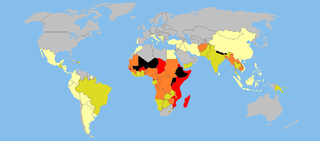
A significant proportion of children in India are engaged in child labour. In 2011, the national census of India found that the total number of child labourers, aged [5–14], to be at 10.12 million, out of the total of 259.64 million children in that age group. The child labour problem is not unique to India; worldwide, about 217 million children work, many full-time.
Child labour in Pakistan is the employment of children to work in Pakistan, which causes them mental, physical, moral and social harm. Child labour takes away the education from children. The Human Rights Commission of Pakistan estimated that in the 1990s, 11 million children were working in the country, half of whom were under age ten. In 1996, the median age for a child entering the work force was seven, down from eight in 1994. It was estimated that one quarter of the country's work force was made up of children. Child labor stands out as a significant issue in Pakistan, primarily driven by poverty. The prevalence of poverty in the country has compelled children to engage in labor, as it has become necessary for their families to meet their desired household income level, enabling them to afford basic necessities like butter and bread.

Morris Isaacson High School is a government secondary school in Soweto. Founded in 1956, the school took an important role at the start of the Soweto Uprising in 1976.
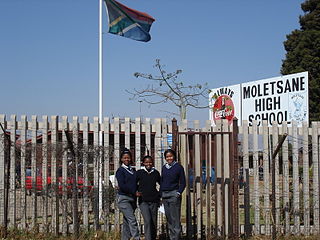
Moletsane High School is a government secondary school in Soweto, South Africa. Founded in 1972 it became a secondary school in 1976. Students from the school were involved in the Soweto Uprising in 1976. The school's public/private partnership and the school's improvements in its results were praised by the South African Minister for Education.
Child Marriage in Sudan. In 2017 in Sudan, 34% of girls are married off before the 18 years old. 12% are married before they turn 15. Sudan is the 29th highest nation in the world for child marriage.

Human rights in Namibia are currently recognised and protected by the Namibian constitution formed in 1990 by a 72-seat assembly. The assembly consisted of differing political parties. After a draft, the constitution was agreed upon by all members of the seven political parties involved. 21 March 1990 marks the first day Namibia operated under the Constitution and also marks the recognition of Namibia as an independent nation. Chapter 3 of the constitution entitled Fundamental Human Rights and Freedoms, also referred to as the Bill of Rights, outlines the human rights of all Namibian citizens.

India is the second most populated country in the world with nearly a fifth of the world's population. According to the 2022 revision of the World Population Prospects the population stood at 1,407,563,842.














